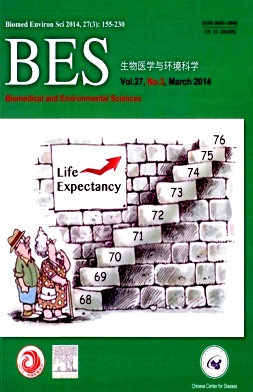Sodium Butyrate Induces Apoptosis of Human Colon Cancer Cells by Modulating ERK and Sphingosine Kinase 2
doi: 10.3967/bes2014.040
-
Key words:
- Sodium butyrate /
- Apoptosis /
- ERK /
- Sphingosine kinase 2 /
- Colon caner
Abstract: Objective To investigate the role of extracellular signal-regulated kinase (ERK) in apoptosis of human colon cancer (HCT116) cells.
Methods After the HCT116 cells were pretreated with specific ERK inhibitor (U0126) or specific siRNA and exposed to 10 mmol/L sodium butyrate (NaBT) for 24 h, their apoptosis was detected by flow cytometry, levels of SphK2 and ERK protein were measured by Western blot, and translocation of SphK2 was assayed by immunofluorescence microscopy.
Results The U0126 and siRNAs specific for SphK2 blocked the export of SphK2 from nuclei to cytoplasm and increased the apoptosis of HCT116 cells following NaBT exposure. Over-expression of PKD decreased NaBT-induced apoptosis of HCT116 cells, which was reversed by U0126. Furthermore, transfection of HCT116 cells with constitutively activated PKD plasmids recovered the U0126-blocked export of SphK2.
Conclusion ERK regulates the export of SphK2 and apoptosis of HCT116 cells by modulating PKD. Modulation of these molecules may help increase the sensitivity of colon cancer cells to the physiologic anti-colon cancer agent, NaBT.
| Citation: | XIAO Min, LIU Yun Gang, ZOU Meng Chen, ZOU Fei. Sodium Butyrate Induces Apoptosis of Human Colon Cancer Cells by Modulating ERK and Sphingosine Kinase 2[J]. Biomedical and Environmental Sciences, 2014, 27(3): 197-203. doi: 10.3967/bes2014.040 |







 Quick Links
Quick Links
 DownLoad:
DownLoad: